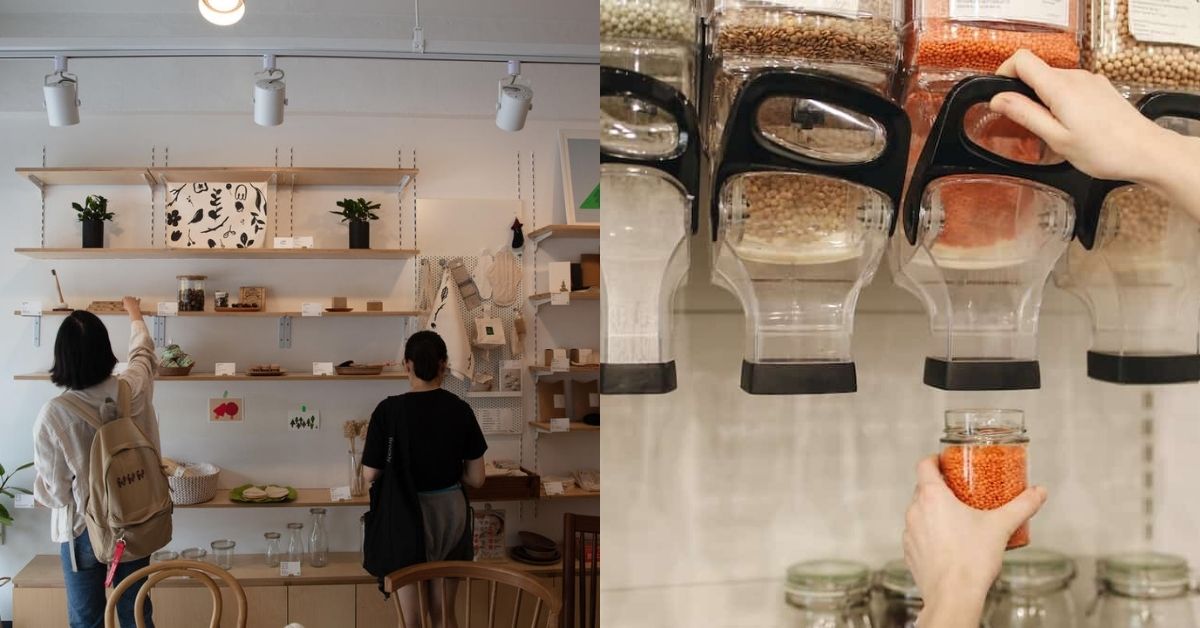Globally, Malaysia is ranked 8th in the top 20 countries with the most mismanaged plastic waste in the world.
Moreover, with boba stores springing up like mushrooms after the rain in Malaysia, plastic pollution has worsened over the years, especially in Klang Valley.
If you can recall, there was the infamous picture circulating around Facebook of boba cups overflowing in one of SS15’s large industrial rubbish bins a year ago.

While limiting our consumption is one way to go about it, going zero waste is the direction that the nation should be taking.
This was proposed by ex-MESTECC Minister Yeo Bee Yin who, along with her team, created Malaysia’s Roadmap Towards Zero Single-use Plastics 2018-2030.
The realisation of such a mass-scale problem in our country brought in zero waste stores to create a zero waste shopping environment for Malaysians.
However, this solution isn’t as accessible for everyone for two reasons: location and price.
Too Far From Zero Waste
Most zero waste stores are located and branched throughout KL and Selangor, leaving the other states with only one or two in theirs (with the exception of 5 BYOB stores in Sarawak).
Moreover, zero waste stores are mostly saturated in T20 and some M40 neighbourhoods.
Take for instance, the Hive, the first zero waste store in Malaysia.

Although it has the most branches compared to its other competitors, they are located in Bangsar, Intermark Mall, and TTDI, and 2 pushcarts in Pavilion and Starling Mall.
These locations have a high concentration of T20, which means their more financially-privileged residents are the ones who can access their goods the easiest.
This brings me to my second point of the accessibility of pricing.
Too Broke For Zero Waste
When zero waste stores branch out like The Hive to cater only to this particular demographic, it makes the lifestyle harder to achieve for less privileged citizens.
They’d have to take in the cost of travelling back and forth, which is much higher than that of residents who live nearby those places and can easily access these stores.
On top of that, the price of subscribing to some zero waste necessities can burn your pocket.
For instance, zero waste dental products such as bamboo toothbrushes, compostable floss, and tablet toothpaste.
Bamboo toothbrushes from these stores can range from RM8 (Mineraw) to RM15 (The Hive).
Compostable floss are RM18 per 30m for both NUDE and The Hive.
Tablet toothpaste can range from RM25 per 25g (Frangipani) to RM52 per 45g (Lush).
Continuously subscribing to these products as necessities are definitely not the most economic for many, especially the M40 and B40 population.
However, here’s why it’s okay that zero waste stores aren’t as accessible to everyone for now.
Don’t Pressure The Stores, Pressure The Rich
The zero waste industry has only recently penetrated the Malaysian market.
While they mostly sell their products in bulk, a lot of them aren’t mass-produced, which results in a higher price point.
Moreover, most zero waste stores in Malaysia have yet to branch out like The Hive and BYOB, given how relatively new this shopping environment is.
When a person is wealthier, it is by default that their carbon footprint is higher than that of a less wealthy person.
The size of your house, the number of cars you own, the frequency of your holidays, the places you shop and eat at, all contribute to your carbon footprint.
A wealthier person would be more likely to have most, if not all, the factors above, thus leading to their higher carbon footprint contribution. In our country, this would be the T20 group.
That being said, however, being wealthy isn’t inherently a bad thing—it’s how you use the wealth that matters.
Given the higher share of carbon emissions that wealthier groups emit, it seems reasonable that they take a higher share of responsibility towards it as well.
After all, they are the ones who will be able to afford the zero waste lifestyle much more than the M40 and B40 groups in Malaysia.
Not only will they be making up for their higher carbon emissions in the nation, but this lifestyle won’t even impact their wealth as much.
Furthermore, their consistent investment and support to this market would grow it even more and enable it to branch out.
Eventually, this lifestyle would be accessible to the M40 and B40 groups in Malaysia, but most likely only if these businesses become profitable.
Taking into account these factors, it makes economic sense why zero waste stores are still catering to wealthier groups in Malaysia for now.
Instead of pressuring these businesses to cater to a wider demographic of Malaysians, the pressure should be on wealthier groups to first adopt this lifestyle and invest in these businesses to progress towards this change.
-//-
Of course, living the DIY zero waste lifestyle is absolutely possible for many non-T20, but truth be told, it takes a lot of dedication.
Zero waste stores exist to lower or reduce the barriers that turn one off from adopting the lifestyle.
Those of us with full-time jobs simply don’t have the time or energy to DIY zero waste lifestyles, so we’re more likely to simply buy the products.
However, as argued above, the stores aren’t readily accessible nor affordable just yet, and until then, the lifestyle adoption would still have a rather slow uptake.
- You can read about other opinion pieces we’ve written here.
Featured Image Credit: Greenpeace / Green Is The New Black









